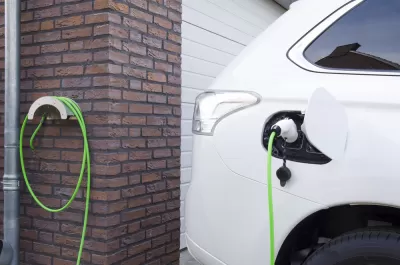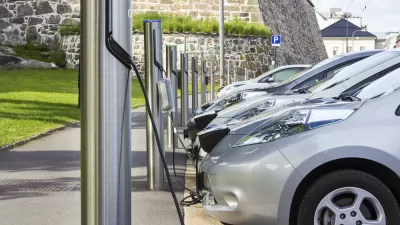CPUC Commissioner Carla Peterman explains the state's investment plan for building out electric vehicle charging stations in public spaces and homes.

In late May, the California Public Utilities Commission unanimously approved investing $768 million in programs and projects to broadly expand the network of electric vehicle charging stations and other infrastructure throughout the state of California. With more than 400,000 electric cars on the road in California, The Planning Report sat down with CPUC Commissioner Carla Peterman for an interview to discuss the significance of this investment, the role of the utilities in electric charging infrastructure, and how energy storage fits into the procurement decisions surrounding the state's electricity grid in the coming years.
Peterman, who previously served on the California Energy Commission and directed the California Plug-In Electric Vehicle Collaborative (now Veloz), outlined how the investments demonstrate California’s commitment to EVs, seed infrastructure for the early adopters, and \ leave room for innovative models to come forward and make EV charging cheaper in the next few years. California's ambitious goal, established by the governor via executive order earlier this year, charges the state to get 5 million zero-emission vehicles on the road by 2030. Peterman, who worked on drafting the executive order, believes that the state is undergoing a transportation transformation towards electrification. With the CPUC's funds going to the investor-owned utilities within California (Pacific Gas & Electric, Southern California Edison, and San Diego Gas & Electric), the utilities plan to increase the incentives for installing EV charging and participating in pilot programs.
As California lawmakers debate the future of the electricity system as a whole, Peterman provided context on how the Public Utilities Commission was addressing the role of utilities in transportation electrification. She believes that it has three parts: one an infrastructure provider, second as a distribution grid manager, and third as a fuel provider. With the decarbonization of the electricity grid remaining as one of the Brown administration's highest priorities, Peterman believes that electric vehicles could be used to store excess renewable energy and help integrate low-carbon solutions that can provide ratepayer benefits.
Read the full interview in The Planning Report.
FULL STORY: Carla Peterman on CPUC’s Vote to Invest in EV Charging Infrastructure

Alabama: Trump Terminates Settlements for Black Communities Harmed By Raw Sewage
Trump deemed the landmark civil rights agreement “illegal DEI and environmental justice policy.”

Study: Maui’s Plan to Convert Vacation Rentals to Long-Term Housing Could Cause Nearly $1 Billion Economic Loss
The plan would reduce visitor accommodation by 25% resulting in 1,900 jobs lost.

Planetizen Federal Action Tracker
A weekly monitor of how Trump’s orders and actions are impacting planners and planning in America.

Wind Energy on the Rise Despite Federal Policy Reversal
The Trump administration is revoking federal support for renewable energy, but demand for new projects continues unabated.

Passengers Flock to Caltrain After Electrification
The new electric trains are running faster and more reliably, leading to strong ridership growth on the Bay Area rail system.

Texas Churches Rally Behind ‘Yes in God’s Back Yard’ Legislation
Religious leaders want the state to reduce zoning regulations to streamline leasing church-owned land to housing developers.
Urban Design for Planners 1: Software Tools
This six-course series explores essential urban design concepts using open source software and equips planners with the tools they need to participate fully in the urban design process.
Planning for Universal Design
Learn the tools for implementing Universal Design in planning regulations.
Caltrans
Smith Gee Studio
Institute for Housing and Urban Development Studies (IHS)
City of Grandview
Harvard GSD Executive Education
Toledo-Lucas County Plan Commissions
Salt Lake City
NYU Wagner Graduate School of Public Service




























